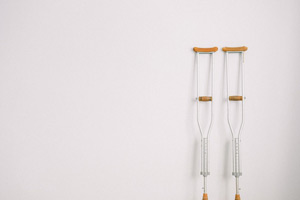
All property owners and occupiers must ensure their property is reasonably safe for visitors. This is the law in Nova Scotia, and there are very few exceptions.
Unfortunately, this does not always happen. Property owners sometimes negligently do or fail to do something that puts people’s safety at risk. When injuries happen as a result of a property owner’s negligent actions or inaction, they can be found responsible. This is called “occupiers’ liability.”
If you were hurt in an accident involving unsafe property in Halifax or elsewhere in Nova Scotia, the compassionate slip and fall injury lawyers at Valent Legal can help.
Slip and fall accidents from wet floors, uneven tiles, broken handrails, and slippery surfaces are among the most common type of occupiers’ liability claims. These claims can also include injuries from other hazards, such as poorly constructed houses or decks, falling merchandise in stores, or unsafe construction sites.
Victims of property owner negligence can suffer sprains, strains, concussions, chronic pain, migraines, sleep disorders, broken bones, and other trauma that can have severe consequences, particularly for the vulnerable and elderly.
The compassionate occupiers’ liability lawyers at Valent legal understand that any injury can have a serious and long-lasting effect. We are here to help guide you through the claim process, while you focus on your recovery. You will find our lawyers to be down-to-earth, easy to talk to, and not intimidating. We treat our clients like people, not just cases.
For a free, no-risk case assessment, give us a call or contact us online now. We work on a contingency fee basis, which means there are no fees until you get a settlement, or you win a judgment in court.
What Do You Have to Prove in a Halifax Slip and Fall Claim?
An “occupier” is defined under Nova Scotia’s Occupiers’ Liability Act as a person who is in physical possession of premises or who has responsibility for, and control over, the condition of premises, the activities conducted on the premises, or the persons allowed to enter the premises. There can be more than one occupier of the same premises.
The term “premises” is defined as:
- Land and structures (except portable structures and equipment)
- Water
- Ships and vessels
- Trailers
- Portable structures
An occupier of any premises owes a duty to protect any person who sets foot on their property from unnecessary injury.
The Occupiers’ Liability Act states that this duty applies in respect to:
- The condition of the premises
- Activities on the premises
- The conduct of third parties on the premises
When determining whether this duty of care was discharged, the Occupiers’ Liability Act provides that consideration should be given to:
- The knowledge that people will likely be on the premises
- The circumstances surrounding their entry to the property
- The age of the person entering the premises and their ability to recognize hazards and known dangers
- Any efforts made to warn of known dangers to visitors
- Any reasonable expectations of protection that should be extended to visitors
The Occupiers’ Liability Act also states that the duty of care does not apply to:
- Risks willingly assumed by people entering premises
- Areas that are deemed to be willing assumptions of risk include land used primarily for agricultural or forestry purposes, vacant or undeveloped rural land, forested or wilderness land, recreation facilities when closed for the season
- Utility rights-of-way and corridors, excluding structures located on them, highway reservations under the Public Highways Act
- Private roads on private land
- Private roads Nova Scotia law does not otherwise apply to
- Reasonably marked by notice as private, where persons are physically restricted from access by a gate or other structure
- Recreational trails that are reasonably marked
In general, a person injured in a slip and fall accident in Nova Scotia must prove that an owner or occupier was negligent and failed to uphold their legal duty of care. Proving negligence will involve demonstrating that an owner or occupier failed to take reasonable care in preventing a slip and fall accident.
How Can a Slip and Fall Lawyer in Halifax Help?
The first thing that a lawyer is going to be able to do for you after a slip and fall accident is immediately conduct their own independent investigation into the accident. The lawyer can determine the true cause of the accident and also secure all of the evidence needed to prove someone else’s fault.
A lawyer may look at several factors to determine if you have a case worth pursuing, including, for example, the weather at the time of the fall, the shoes you were wearing, whether you were wearing glasses or contacts, the involvement of alcohol, and the existence of dangerous conditions. If you have a case against a negligent party, then the lawyer may be able to begin negotiating a possible settlement to your case.
You need a lawyer to handle settlement negotiations because chances are that whatever you are offered independently and initially will be far less than what you are really entitled to.
Compensation Available After a Slip and Fall Accident in Halifax
After a slip and fall accident, a settlement can be one resolution to the case that allows you to avoid having to go to court. An acceptable settlement amount should be enough to cover all of your past, present, and future expenses. Not all cases can be settled, however. So some must go to court in order to secure fair compensation
In Nova Scotia, a civil case must be proven based on a balance of probabilities, which simply means that an allegation was more probable than not. It is simply defined as being more than 50 percent likely to true.
When an injured person is successful in court, they could be awarded a number of different damages. The most common kinds of damages, or monetary awards, in slip and fall cases are pecuniary damages and non-pecuniary damages.
Pecuniary damages apply to actual costs to a victim that can be proven and calculated, such as lost income, loss of future earning capacity, medical bills, and the cost of required assistance. Non-pecuniary damages are far more subjective, and are usually for pain and suffering, mental distress, and loss of amenity.
Punitive damages are also possible in Nova Scotia but are exceptionally rare. These damages are awarded more to punish defendants for particularly egregious forms of misconduct and are not typically awarded for basic acts of negligence.
Common Causes of Slip and Fall Accidents in Nova Scotia
The simple truth about slip and fall accidents is that they often occur suddenly and without warning when people are least expecting to be involved in any kind of accident. The cause of a slip and fall may seem obvious in hindsight, but the threat was difficult for a person to recognize at the time.
Some of the most common causes of slip and fall accidents generally include:
- Spilled liquids
- Torn floor mats
- Cluttered walking spaces
- Broken handrails
- Loose floorboards
- Exposed cords and other obstacles
- Cracked, defective, or broken sidewalks
- Dirty or trash-covered floors
- Potholes
- Snow and ice
- Ripped or torn carpeting
- Inadequate lighting
- Slippery floors
- Unsafe or hazardous property
- Stray electrical cords and wires
- Inclement weather
Do not worry if you are not entirely sure what caused your slip and fall accident. Get our lawyers involved right away so we can investigate and determine the exact cause of your fall in order to hold the proper party accountable.
Common Places in Halifax Where Slip and Fall Accidents Occur
Slip and fall accidents can happen just about anywhere people are walking. No single location is an exclusive site for these kinds of accidents, and nowhere is completely safe.
Examples of some of the more common locations for slip and fall accidents include:
- Grocery stores
- Retail stores
- Restaurants
- Bars
- Movie theaters
- Amusement parks
- Small businesses
- Office buildings
- Parking lots and parkades
- Hotels and resorts
- Public spaces
- Workplaces
- Staircases
- Escalators and elevators
- Homes
Determining who the owner or occupier of a premises is not always easy. Our lawyers are ready to determine who the liable party is and work to seek maximum compensation for your injuries.
Common Injuries Caused by Falls
People can suffer a wide range of injuries in slip and fall accidents. Some people will be able to walk away from their accidents without any injuries, while many others could face several days, weeks, or months of hospitalization. Some victims never fully recover. Certain types of slip and fall injuries can even be fatal.
Some of the more common kinds of injuries can include:
- Neck and back injuries
- Fractures
- Joint damage, especially to knees and ankles
- Lacerations
- Spinal cord injuries, including paralysis
- Traumatic brain injuries (TBIs)
- Sprains
- Pulled muscles
- Soft tissue injuries
- Internal organ damage
When a slip and fall accident results in fatal injuries, the victim’s family could be entitled to file a wrongful death claim. Families in these cases could be entitled to damages for loss of financial support, care, guidance, services, and companionship.
What to Do If You’ve Been Hurt in a Fall in Nova Scotia
The first thing you need to do after a slip and fall accident is to get medical attention. Go to a hospital even if you do not at first think you were hurt. It is critical to receive medical care as soon as possible. Some injuries may have delayed symptoms but could be very serious if left untreated.
You can also do yourself a favor by trying to take as many pictures as you can of everything involved in the accident scene, especially whatever the hazard was that caused your fall. Get photographs before the danger is corrected by the property owner and the evidence disappears.
If there were other people who saw the accident, ask them for their names and contact info. These individuals could prove to be very valuable witnesses if there is any dispute about who was at fault.
Talk to a Nova Scotia Slip and Fall Lawyer Now
If you suffered serious injuries or your loved one was killed in a slip and fall accident in Halifax or a surrounding area of Nova Scotia, contact Valent Legal right away. We know the impact that an injury can have on your life and the lives of your family members. If it was caused by the negligence of a property owner or occupier, we will be ready to help you get compensation and justice.
Our team is known for our skillful representation and compassionate approach to client care. We represent clients on a contingency fee basis, which ensures that you won’t pay anything out of pocket unless and until we secure compensation for you.
You can have us help you understand all of your legal options when you call us or contact us online to schedule a free case discussion.








